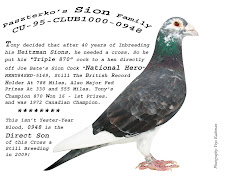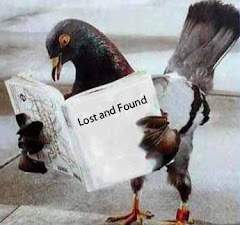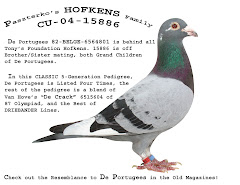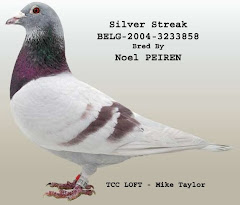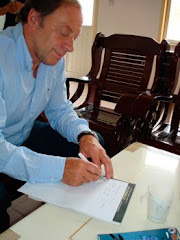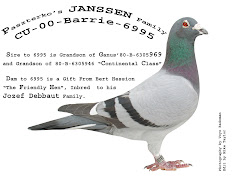The Toronto Star
Saturday, April 20 1991
Earl Kitto trains and races homing pigeons
VERNON, B.C. (CP) - Earl Kitto gave his son's homing pigeons away twice. They came back. Twice. So now he has an absorbing hobby: racing pigeons. Some of his older birds have raced home to Vernon from as far away as Smithers, B.C., 725 kilometres (450 miles) as the crow - or pigeon - flies.
FLIGHT ATTENDANT: Some of Earl Kitto's prize pigeons have raced home from as far away as 725 kilometres. He has a flock of 42 adult birds.
Released daily from their loft for exercise, the flock of 42 adult birds circles above Kitto's land north of this Okanagan community for two or three hours at a stretch. The birds are athletes and Kitto begins conditioning them early at about 4 months. "You just take them in cages about a mile away the first time," he says, adding he keeps moving farther out each day.
They are comical to watch as they overshoot the slippery loft roof and clumsily negotiate turns in the air. "It takes a while to learn to turn and some don't come back for a couple of days." Some return with broken legs. Kitto splints them. He loses about six birds a year - to hawks, in collisions, or during the confusion created by electrical storms.
Both males and females race, and Kitto's hens routinely out do the cocks. Birds race against the clock. They're trucked to a release point, often several hundred kilometres from home, and all are released at a pre-arranged time. As each bird returns to the loft, an identifying band is removed from its leg and placed in a specially designed timing clock. The winner is the one with the fastest over-all speed. Some racing pigeons, flying with a tailwind, have been clocked at 90 km/h (55 m.p.h.).
Barring disease or accident, pigeons live for about 10 years and can race competitively until about age 7. Most race best between ages 2 and 4. Some bird owners take racing very seriously. When betting takes place, fortunes have been won and lost by the tick of a timing clock. "It's very competitive," says Kitto. "You can make and lose friends real quick."
Pigeon fanciers include Queen, Boxer
WEYMOUTH, England (Reuter) - Clint Eastwood, Mike Tyson and Queen Elizabeth are said to share a common passion: all are devoted to pigeons. That passion can be expensive. In Japan and Taiwan, for instance, prices equivalent to $40,000 U.S. have been quoted for a single bird.
The most sought-after pigeons are from the Jan Aarden strain, which race distances of up to 1,300 kilometres (810 miles), and the Janssen breed, popular with the British Royal Family, including the Queen, who keeps them at her Sandringham estate. The pigeon, a relation of the rock dove, has fascinated man for more than 5,000 years. Egyptian pharaohs and roman warriors used them to carry messages - a trait that news agency founder Paul Julius Reuter later exploited in mid 19th century Europe to bridge communication gaps.
The sport of pigeon racing, which first became popular in Belgium in the early 19th century, is fraught with hazards. In 1912, of 1,638 pigeons released in Marennes, France, to fly to Manchester, England, only 31 arrived. Now breeder Tony Hayne is worried that the thinning of the ozone layer is affecting his birds. "In years gone by, if you released 10 pigeons, you expected 10 pigeons back," he says. "I don't know if it's the change in the climate, with this hole in the atmosphere, but bad races seem to be increasing. A lot of pigeons are being lost for no reason at all."
Hayne, one of Britain's top breeders, and his wife Mary run a pigeon stud farm called Ponderosa Pigeons U.K., based at Weymouth on the southwestern coast of England. Racers are not always scrupulous. Last year, a Dutch racer was banned for 30 years for tampering with the clock used to time his pigeons. "Pigeon nobbling (cheating) has been going on since the sport began," Hayne says.
Sex is another handy racing aid. Female birds are said to fly home much faster if they know their mate was left at home with another female admirer. However, it seems that the owners are the ones who suffer the most torment. "It's no good if you've got a weak heart," says Mary Hayne. "Tony's so nervous I can't even talk to him on race days." Hayne, who is involved in planning an international race for 100,000 birds in Barcelona to coincide with the start of the 1992 Olympic Games in Spain, admits that the anxious wait for a homecoming racing pigeon is tough on the nerves. "You wouldn't believe the number of times I've been standing out there scanning the skies and timed in a sparrow or a butterfly by mistake."
Past sports promotions
Pigeon racing
Pigeon racing








